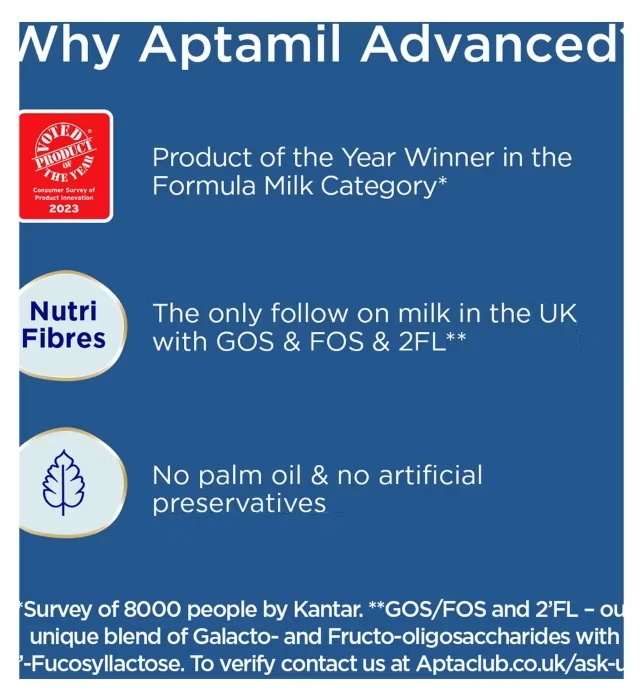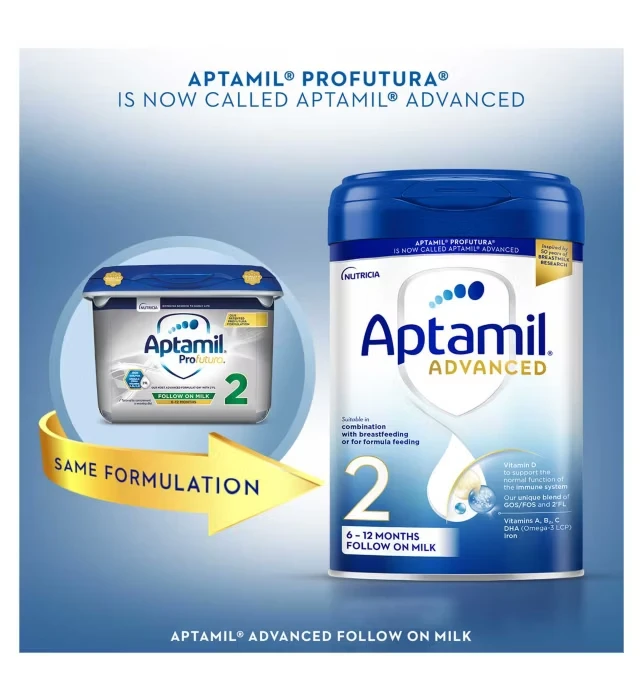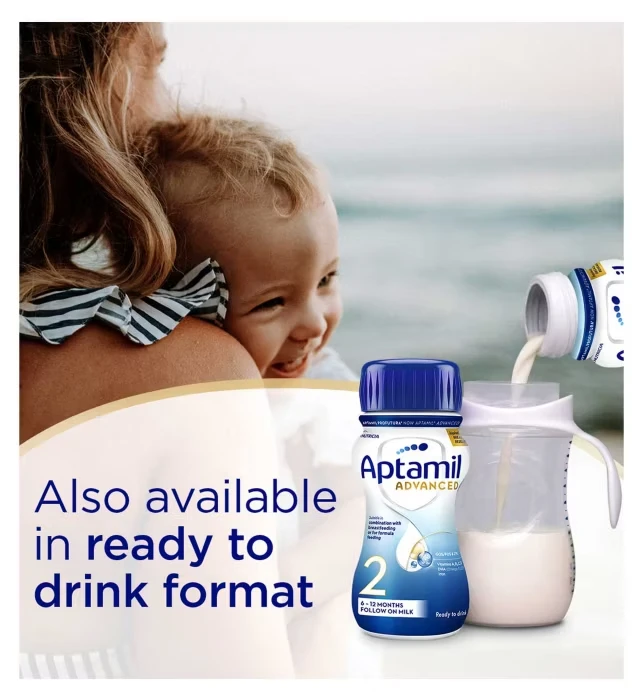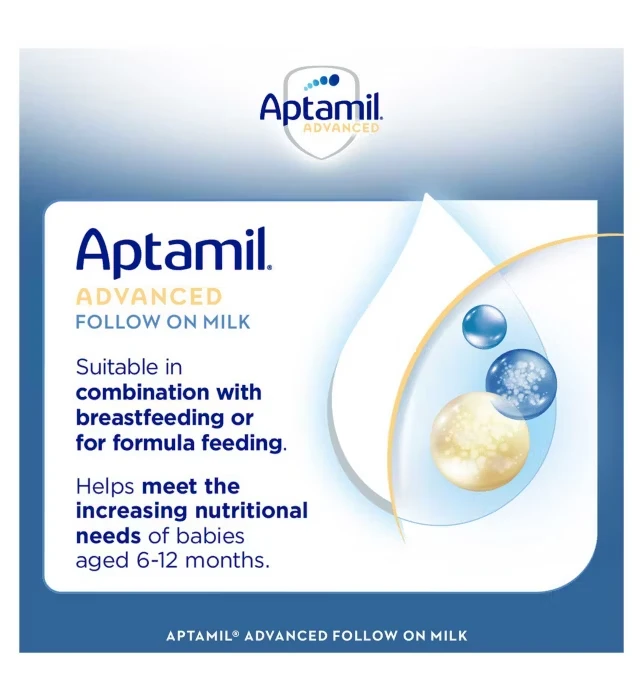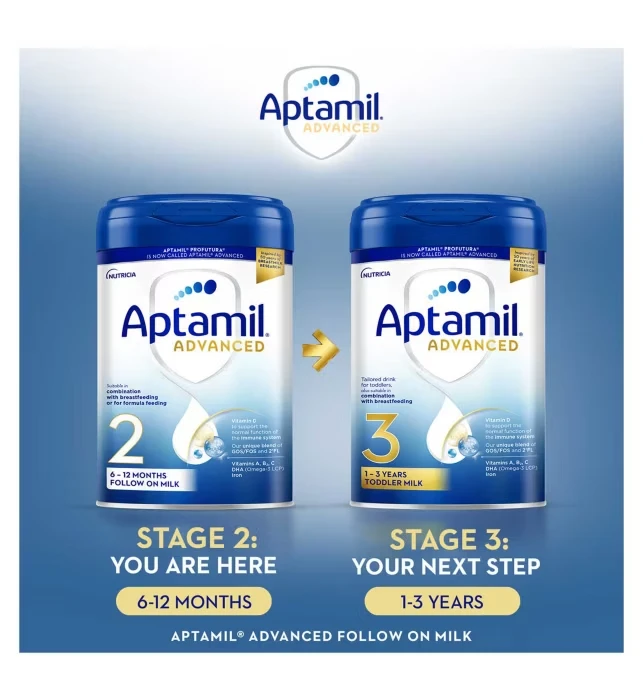Aptamil® Advanced Follow On Milk, our most advanced formulation* (*contains iron to support normal cognitive development) helps meet the increasing nutritional needs of babies aged 6-12 months.
The beginning of your baby's life is a special and beautiful time. Our passionate team of more than 500 scientists and experts are devoted to bringing you and your baby the latest scientific discoveries our research has to offer. Inspired by 50 years of breastmilk research we have gone a step further to develop Aptamil® Advanced Follow On Milk, which is suitable in combination with breastfeeding or for formula feeding.
Supporting you on your baby's journey - Aptamil® Advanced Toddler Milk is tailored for toddlers from 1 to 3 years as part of a varied, balanced diet.
- Our unique blend of GOS/FOS and 2'FL**
- Essential fatty acids ALA and LA for normal growth and development***
- No artificial preservatives‡
** GOS/FOS and 2'FL - our blend of Galacto- and Fructo-oligosaccharides with 2'-Fucosyllactose.
***Benefit obtained from a daily intake of 2g ALA ad 10g LA
‡ As required by the legislation
Every Little Step Counts
- Factory is 100% powered by renewable electricity and sends zero waste to landfill
- Fully recyclable pack. Click the scoop back into the lid before recycling.
We are devoted to providing you and your baby our very best. We don't produce for any supermarket own-label brands.
Suitable for
Situable for Babies aged 6-12 Months*. For 12+ Months and up to 3 Years, use Aptamil Advanced 3 Toddler Formula Milk Powder 800g.
*Breastfeeding is best.
How to use
Preparation and Usage
Preparing Your Baby's Feed
Because powdered milks are not sterile, failure to follow instructions may make your baby ill.
After 6 months, once weaning is established, we recommend giving your baby about 1 pint (500-600ml) per day.
Aptamil® Advanced Follow On Milk helps meet the increased nutritional needs of infants from 6 to 12 months.
This information is given as a guide only. Consult your healthcare professional if you require more advice.
Approx. 1 beaker: No. of level scoops per feed (1 scoop = 4.8g): 7; Quantity of water per feed: 210ml, 7 fl.oz
Important: Always use the scoop provided, please note the colour of the scoop may change from time to time.
- Wash hands and sterilise all utensils according to manufacturers' instructions.
- Boil 1 litre of freshly run water. Leave kettle to cool for 30 minutes and no longer. Measure the required amount of water (refer to feeding guide) into a sterilised beaker. Be careful of scalding. Do not use artificially softened or repeatedly boiled water.
- Using the scoop provided, level off the powder with the built in leveller. Do not press/heap the powder.
- Add the correct measure of powder to the water. Adding too many or too few scoops can be harmful. Place the sterilised lid on the beaker and shake immediately, vertically and vigorously for at least 10 seconds until the powder is dissolved.
- Cool under running tap. Check temperature of feed. Feed immediately.
Important FeedingMake up each feed as required.
For hygiene reasons, do not store made up feeds, discard unfinished feeds as soon as possible, and always within 2 hours.
Do not heat feeds in a microwave, hot spots may occur and cause scalding.
Never add extra scoops or anything else to your baby's feed.
Never leave your baby alone during feeding.
StorageStore powder in a cool, dry place.
Do not refrigerate.
Use powder within 4 weeks of opening.
Best Before: See base of pack
Hazards and Cautions
Food Supplements are intended to supplement the diet and should not be regarded as a substitute for a balanced and varied diet or a healthy lifestyle.
While every care has been taken to ensure this information is as accurate as possible, recipes and nutrition content may occasionally change. As a result, we recommend that you always read the label carefully before consuming any product. The Nutrient Reference Value (NRV) or Reference Intake (RI) as a percentage, helps to show the contribution that a product or portion size can make towards daily intakes. This information is provided as a guide and is not individual advice.
Important notice Breastfeeding is best. Follow On Milk is only for babies over 6 months, as part of a mixed diet. It should not be used as a breastmilk substitute before 6 months. The decision to start weaning in during the use of this product before 6 months should be made only on the advice of a doctor, dietitian, pharmacist, or other professional responsible for maternal and child care, based on baby's individual needs. When bottle feeding, do not allow prolonged or frequent contact of milk feeds with your baby's teeth as this increases the risk of tooth decay. Ask your healthcare professional or dentist for advice. Make sure your baby's teeth are cleaned after the last feed at night.
Important info
Country of Origin: Netherlands
Address: Nutricia Ltd / Nutricia Ireland Ltd
Manufacturer's Address UK: Nutricia Ltd, White Horse Business Park, Trowbridge, Wiltshire, BA14 0XD.
Manufacturer's Address ROI: Nutricia Ireland Ltd, Block 1, Deansgrange Business Park, Deansgrange, Co. Dublin.
Ingredients
Lactose (from Milk)
Skimmed Milk
Vegetable Oils (Sunflower Oil, Rapeseed Oil, High Oleic Sunflower Oil, Coconut Oil)
Demineralised Whey (from Milk)
Anhydrous Milk Fat
Galacto-Oligosaccharides (GOS) (from Milk)
Whey Concentrate (from Milk)
Milk Protein
Phospholipid (from Egg)
Calcium Phosphate
Fructo-Oligosaccharides (FOS)
Fish Oil
2'-Fucosyllactose (2'-FL)
Potassium Chloride
Magnesium Chloride
Potassium Citrate
Sodium Citrate
Vitamin C
Oil from Mortierella Alpina
Choline Chloride
Calcium Carbonate
Taurine
Inositol
Emulsifier (Sunflower Lecithin)
Ferrous Sulphate
L-Carnitine
L-Tryptophan
Zinc Sulphate
Cytidine 5'-Monophosphate
Uridine 5'-Monophosphate Sodium Salt
Adenosine 5'-Monophosphate
Inosine 5'-Monophosphate Sodium Salt
Nicotinamide
Vitamin E
Pantothenic Acid
Antioxidant (Vitamin C)
Guanosine 5'-Monophosphate Sodium Salt
Copper Sulphate
Vitamin A
Thiamin
Riboflavin
Vitamin B6
Potassium Iodide
Folle Acid
Manganese Sulphate
Sodium Selenite
Vitamin K1
Vitamin D3
Biotin
Vitamin B12
Nutrition
per 100 ml prepared feed
Energy 285kJ
68kcal
Fat 3.2g
of which, saturates 1.5g
of which, mono-unsaturates 1.1g
of which, polyunsaturates 0.6g
of which, LCPs† 0.030g
- Arachidonic acid (AA) 0.009g
- Docosahexaenoic acid (DHA) 0.017g
of which, EFAs†† 0.520g
- Linoleic acid (LA) 0.466g
- Alpha-linoleic acid (ALA) 0.054g
Carbohydrate 8.2g
of which, sugars 8.1g
of which, lactose 7.8g
of which, polyols 0.007g
- Inositol 0.007g
Fibre 0.6g
of which, GOS° 0.48g
of which, FOS* 0.08g
of which, 2'-FL** 0.05g
Protein 1.4g
Vitamins
Vitamin A 60µg (15%***)
Vitamin D3 1.7µg (24%***)
Vitamin E 0.94mg TE (19%***)
Vitamin K1 3.2µg (27%***)
Vitamin C 8.5mg (19%***)
Thiamin (B1) 0.05mg (10%***)
Riboflavin (B2) 0.14mg (20%***)
Niacin (B3) 0.46mg (7%***)
Vitamin B6 0.04mg (6%***)
Folate 13µg (10%***)
Vitamin B12 0.11µg (14%***)
Biotin 1.5µg (15%***)
Pantothenic acid 0.46mg (15%***)
Minerals
Sodium 23.0mg (6%***)
Potassium 74mg (7%***)
Chloride 54mg (11%***)
Calcium 75mg (14%***)
Phosphorus 50mg (9%***)
Magnesium 7.0mg (9%***)
Iron 1.0mg (13%***)
Zinc 0.48mg (10%***)
Copper 0.054mg (11%***)
Manganese 0.005mg (<1%***)
Fluoride ≤0.006mg
Selenium 3.2µg (16%***)
Iodine 13µg (16%***)
Others
L-Carnitine 2.0mg
Choline 15mg
Taurine 5.1mg
Non-caloric carbohydrate (GOS°) 0.2g
Nucleotides 2.4mg
***% Reference Intake - a guide to the amount of vitamins and minerals needed per day for infants and young children
†Long-chain polyunsaturated fatty acids
††Essential fatty acids
°Galacto-oligosaccharides / *Fructo-oligosaccharides
**2'-Fucosyllactose
Allergy Advice: For allergens,see ingredients in Bold.
Contains Milk, Eggs and Fish.
Serving size: 100 g
| Average Values / Typical Values | per 100g/ml | per serving | RI% |
|---|
| Energy kJ | 285 | | |
| Energy kcals | 68 | | |
| Fat | 3.2 g | | |
| Fat - of which saturates | 1.5 g | | |
| Fat - of which mono-unsaturates | 1.1 g | | |
| Fat - of which polyunsaturates | 0.6 g | | |
| Carbohydrate | 8.2 g | | |
| Carbohydrate - of which sugars | 8.1 g | | |
| Fibre | 0.6 g | | |
| Protein | 1.4 g | | |



